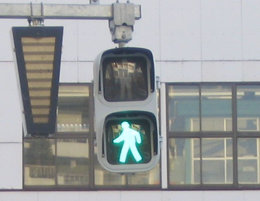Slate.com ran an article yesterday on Apple’s Japanese iTunes Music Store and how frustrating it was that fans of J-POP music around the world couldn’t use the service unless they had a credit card registered to an address in Japan. The article mentioned that certain “underground shops” were providing the prepaid cards to get around this restriction — gee, I wonder who they were talking about? Besides causing the near-total “Slashdotting” of the J-List server while thousands of people followed links to buy the cards from us (which is why the server was sluggish if you were online yesterday, sorry about that), the article made me grin knowingly, really feeling the author’s pain. Japan is an island nation in almost every sense of the word: geographically, of course, but also culturally and socially, and mainstream society here seems perfectly happy to live on a slightly different plane of existence from the rest of the human race. When Japanese record companies negotiated with Apple to make the Japan iTMS, making sure that Japanese bands like Gackt or X Japan or the dreamy voice of Okinawan vocalist Rimi Natsukawa were only available to domestic customers probably made a lot of sense to them. Part of the reason for this is the Japanese fear of the unknown, the terror that there might be a downside lurking in some new idea, requiring that any response should be delayed for as long as possible while the situation is thought through. But I’m convinced another big reason for Japan’s unwillingness to interface with the rest of the world more is its “English Complex,” the quiet embarrassment that many adult Japanese feel over not being able to communicate effectively in English despite six to ten years of study. The whole situation is so silly — I mean, these sprawling corporations were the ones pushing for a truly global world economy, and now that it’s arrived, they want to change their minds? Anyway, if you’d like to become a customer of Apple’s Japan iTMS and browse and buy great Japanese music, we’ve got the prepaid music cards you need. The cards work with the iTunes that’s already installed in your Mac or PC, operate in your native language (except for some Japanese bands and song titles which are in Japanese), and best of all, you can listen to your music on any iPod in the world.
One phrase you learn pretty quickly after coming to Japan is mottai nai (mo’-TIE-NIGH), which translates as “what a waste,” which is short for, “what a waste to throw this perfectly good sofa away, I think I’ll put it in my hallway instead.” Back in my ESL days I did a lot of private teaching, visiting peoples’ homes to tutor their kids in English, and so I got to see how a lot of Japanese families lived. One of the most common trends I noticed were homes that were filled with clutter, with books and mail-order catalogs and portable electronics and fish tanks covering every inch of the home, and nary a table or shelf left empty. The combination of high population, tiny land mass and economic prosperity seems to have lead to too much stuff floating around most homes. Exacerbating the problem is the tendency of older Japanese, who remember when they were lucky if they had plain white rice to eat once a day, to never throw anything away. This is the case with my mother-in-law, who can’t get into her bedroom because our old sofa is in the hallway, blocking the door — it would have been mottai nai to throw it away, so she kept it.
I talk a lot about how Japan is said to trail behind the West socially, following about a decade or so behind while the U.S. and Europe blaze trails in new directions. Many areas of Japan’s society, from laws governing child safety seats in cars to sekuhara (sexual harassment) at work to rules about who can smoke and where, regularly take their cues from the West. In some ways it’s a good strategy — I mean, it makes sense to wait a decade and see how the U.K.’s “big bang” banking reforms play out before implementing a similar program yourself, and there’s a Japanese proverb that advises us to “strike a stone bridge three times with your walking stick before crossing” to ensure that it’s safe. The newest area of Japan’s society to look towards the Occident might just be eating habits, if the recent release of McDonald’s “Mega Mac” (a Big Mac with four meat patties instead of two) is any indication. The limited-edition burger sold a whopping 3 million units in just a few days, and some stores had to stop selling them lest they run out of meat for their other hamburgers.















